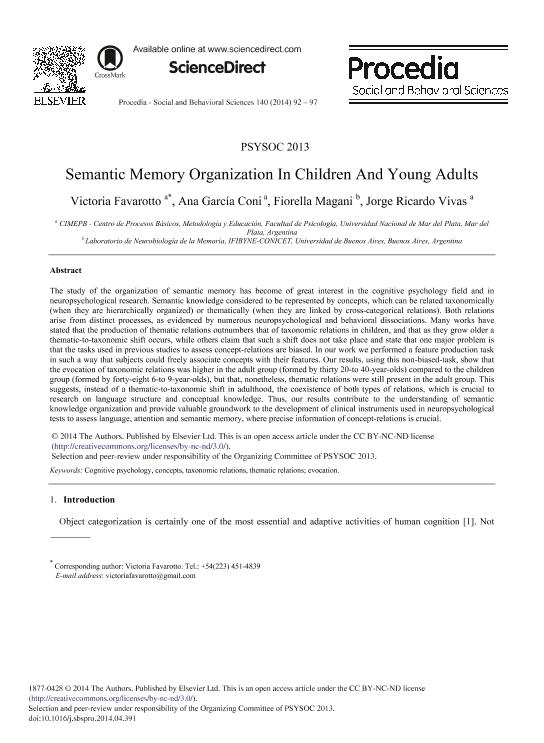Mostrar el registro sencillo del ítem
dc.contributor.author
Favarotto, Victoria

dc.contributor.author
García Coni Bosch, Ana Virginia

dc.contributor.author
Magani, Fiorella

dc.contributor.author
Vivas, Jorge Ricardo

dc.date.available
2018-01-29T12:23:03Z
dc.date.issued
2014-09
dc.identifier.citation
Favarotto, Victoria; García Coni Bosch, Ana Virginia; Magani, Fiorella; Vivas, Jorge Ricardo; Semantic Memory Organization in Children and Young Adults; Elsevier Science; Procedia - Social and Behavioral Sciences; 140; 9-2014; 92-97
dc.identifier.issn
1877-0428
dc.identifier.uri
http://hdl.handle.net/11336/34819
dc.description.abstract
The study of the organization of semantic memory has become of great interest in the cognitive psychology field and in neuropsychological research. Semantic knowledge considered to be represented by concepts, which can be related taxonomically (when they are hierarchically organized) or thematically (when they are linked by cross-categorical relations). Both relations arise from distinct processes, as evidenced by numerous neuropsychological and behavioral dissociations. Many works have stated that the production of thematic relations outnumbers that of taxonomic relations in children, and that as they grow older a thematic-to-taxonomic shift occurs, while others claim that such a shift does not take place and state that one major problem is that the tasks used in previous studies to assess concept-relations are biased. In our work we performed a feature production task in such a way that subjects could freely associate concepts with their features. Our results, using this non-biased-task, show that the evocation of taxonomic relations was higher in the adult group (formed by thirty 20-to 40-year-olds) compared to the children group (formed by forty-eight 6-to 9-year-olds), but that, nonetheless, thematic relations were still present in the adult group. This suggests, instead of a thematic-to-taxonomic shift in adulthood, the coexistence of both types of relations, which is crucial to research on language structure and conceptual knowledge. Thus, our results contribute to the understanding of semantic knowledge organization and provide valuable groundwork to the development of clinical instruments used in neuropsychological tests to assess language, attention and semantic memory, where precise information of concept-relations is crucial.
dc.format
application/pdf
dc.language.iso
eng
dc.publisher
Elsevier Science

dc.rights
info:eu-repo/semantics/openAccess
dc.rights.uri
https://creativecommons.org/licenses/by-nc-sa/2.5/ar/
dc.subject
Cognitive Psychology
dc.subject
Concepts
dc.subject
Taxonomic Relations
dc.subject
Thematic Relations
dc.subject
Evocation
dc.subject.classification
Psicología

dc.subject.classification
Psicología

dc.subject.classification
CIENCIAS SOCIALES

dc.title
Semantic Memory Organization in Children and Young Adults
dc.type
info:eu-repo/semantics/article
dc.type
info:ar-repo/semantics/artículo
dc.type
info:eu-repo/semantics/publishedVersion
dc.date.updated
2018-01-26T18:59:07Z
dc.journal.volume
140
dc.journal.pagination
92-97
dc.journal.pais
Países Bajos

dc.journal.ciudad
Amsterdam
dc.description.fil
Fil: Favarotto, Victoria. Universidad Nacional de Mar del Plata. Facultad de Psicología. Centro De Investigación en Procesos Básicos, Metodologías y Educación; Argentina
dc.description.fil
Fil: García Coni Bosch, Ana Virginia. Consejo Nacional de Investigaciones Científicas y Técnicas; Argentina. Universidad Nacional de Mar del Plata. Facultad de Psicología. Centro De Investigación en Procesos Básicos, Metodologías y Educación; Argentina
dc.description.fil
Fil: Magani, Fiorella. Consejo Nacional de Investigaciones Científicas y Técnicas. Oficina de Coordinación Administrativa Ciudad Universitaria. Instituto de Fisiología, Biología Molecular y Neurociencias. Universidad de Buenos Aires. Facultad de Ciencias Exactas y Naturales. Instituto de Fisiología, Biología Molecular y Neurociencias; Argentina
dc.description.fil
Fil: Vivas, Jorge Ricardo. Universidad Nacional de Mar del Plata. Facultad de Psicología. Centro De Investigación en Procesos Básicos, Metodologías y Educación; Argentina
dc.journal.title
Procedia - Social and Behavioral Sciences
dc.relation.alternativeid
info:eu-repo/semantics/altIdentifier/doi/http://dx.doi.org/10.1016/j.sbspro.2014.04.391
dc.relation.alternativeid
info:eu-repo/semantics/altIdentifier/url/https://www.sciencedirect.com/science/article/pii/S1877042814033175
Archivos asociados
